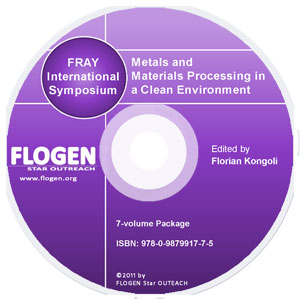
CD shopping page |
2011-Sustainable Industrial Processing Summit
|
| Editors: | Florian K |
| Publisher: | Flogen Star OUTREACH |
| Publication Year: | 2012 |
| Pages: | 708 pages |
| ISBN: | 978-0-9879917-1-3 |
| ISSN: | 2291-1227 (Metals and Materials Processing in a Clean Environment Series) |
Analysis Of A Breakout Of A Concast Steel In The Secondary-Cooling Zone
Frantisek Kavicka1;1BRNO UNIVERSITY OF TECHNOLOGY, Brno, Czech Republic;
Type of Paper: Regular
Id Paper: 265
Topic: 5
Abstract:
The solidification and cooling of a continuously cast slab and the simultaneous heating of the mold is a very complicated problem of three-dimensional (3D) transient heat and mass transfer. The solving of such a problem is impossible without numerical models of the temperature field of the concasting itself while it is being processed through the concasting machine. Experimental research and measurements have to take place simultaneously with numerical computation, not only to be confronted with the numerical model but also to make it more accurate throughout the process. An important area of the caster is the so-called secondary cooling zone, which is subdivided into thirteen sections, where the first section uses water jets from all sides of the concasting and the remaining twelve sections engage air-water cooling jets positioned only on the upper and lower sides of the concasting.In the secondary-cooling zone, where the slab is beginning to straighten out the breakout of the steel can occur in points of increased local chemical and temperature heterogeneity of the steel, from increased tension as a result of the bending of the slab and also from a high local concentration of non-metal, slag inclusions. Especially dangerous are the changes in the chemical composition of the steel during the actual concasting. In the case of two melts one immediately after the other, this could lead to immediate interruption in the concasting and a breakout. The material, physical, chemical and technological parameters, which both melts differed in were determined. If the dimensionless analysis is applied for assessing and reducing the number of these parameters, then it is possible to express the level of risk of breakout as a function of five dimensionless criteria.